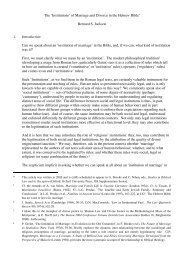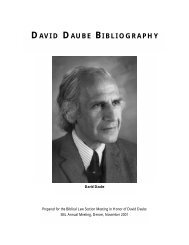- 22 –Ilan FuchsIlan Fuchs (University of Calgary) and Aviad Hollander (Bar-Ilan University) – Rabbi Shlomo Goren and International law:critical dialogue with concepts of sovereignty and human rights (Session 6C)This paper is part of an ongoing research on the interaction between religion and international law. It focuses on one of the leadingdecisors in the second part of the 20 th century: Rabbi Shlomo Goren. Rabbi Goren was one of the leading rabbinic figures in thereligious Zionist community and the Chief Rabbi of the Israeli army, later he became the chief rabbi of Israel and the head of thehigh rabbinical court for appeals. His position gave him wide latitude to influence halachic policy and his rulings.The paper examines an interaction with International law from the perspective of an outsider. International law is aEuropean construct; it is a product of process beginning with the Westphalia accords that developed over time hand in hand withthe modern concepts of nationalism and liberalism. Halacha is a legal system created in a different reality and for the most partwith little connection and interest to development in modern political thought and law.Rabbi Goren was in a predicament, the establishment of the state of Israel demanded a discussion with internationalpolitics and norms. For a religious Zionist that wanted to take part in the political process and to have a say in the fashioning of theIsraeli state he had to draft a position vis-à-vis international law and it’s underlining axioms that are connected to liberalism.The paper examines this critical dialogue its points of agreement and points of disagreement and offer some conclusionthat have a broad ramification on the relationship of halacha and western values.Ilan Fuchs is currently a visiting professor at the University of Calgary, where he teaches a variety of courses on Jewishand Israeli law. Prior to arriving in Calgary, he was a Schusterman visiting Israeli professor at Tulane University. Hisresearch interests include gender and Judaism, the intersection of Halacha and modernity, and the role of Orthodoxpolitics in modern democratic society. Aviad Hollander wrote his Doctoral thesis in the Talmud Department at Bar-Ilan University, researching the halakhicrulings of Rabbi Shlomo Goren, the founder of the Israeli army rabbinate. He teaches courses at Bar-Ilan dealing with theconflict between Halakha and the State of Israel, in general, and the Israeli Military in particular.Aharon GaimaniAharon Gaimani (Bar-Ilan University) – Levirate Marriage among Yemenite Jewry: New Documents (in Hebrew, Session 5C)For a number of reasons, Ashkenazi communities preferred to perform the ritual of chalitzah rather than the ritual ofyibum, The decree of Rabbeinu Gershom Me'Or Hagolah, “Our teacher Gershom the light of the exile," prohibits multiple wives,and in order to avert polygamy the decree was upheld even in cases when the ritual of yibum was required. Moreover, according toRabbeinu Tam, a chalitzah is preformed in case the brother-in-law, the "Yabbam," is already married. Furthermore, according tothe Tanna Abba Shaul the commandment of chalitzah precedes the ritual of yibum, an opinion that Ashkenazi rabbis adopted. Theposition of Ashkenazi communities in the 13 th century can be derived from the words of Asher ben Yechiel, the “Rosh”: “TheHalacha follows that which is written in the first section of Bechorot, that now the commandment of chalitzah is preformed first, asthe opinion of Abba Shaul.”In the Sephardic communities and Islamic countries, the preference was opposite. That is, they would rather perform theritual of yibum over the ritual of chalitzah, in accordance to the opinions of the Rif, also knows as Rabbi Isaac al-Fasi, and theRambam, or, Moses Maimonides. As the Rambam writes, “It is a positive commandment of Scriptural law for a man to marry thewidow of his paternal brother if he died without leaving children, as [Deuteronomy 25:5] states: "[And one of them dies]childless... her husband's brother should cohabit with her… The mitzvah of yibbum takes precedence over the mitzvah ofchalitzah.”The difference in preference between the Ashkenazi and the Sephardic communities in the 14 th century was noted by theRosh when he moved from Germany to Spain, as he writes in one of his responses, “Know that in Germany and in France it iscustomary not to perform yibbum, even if both parties want to do so, as in accordance of the those great rabbis that ruled thatchalitzah precedes yibbum, hence we force them to perform the ritual of chalitzah. In the other countries that I have passed throughand in this country I have witnessed them perform yibbum as in accordance of the ruling of Rabbi Isaac al-Fasi, and so I have
- 23 –stopped ruling or from performing the commandment of chalitzah or of yibbum.”The Jews of Yemen preformed the commandment of yibbum in accordance with the ruling of Maimonides, andcommunities especially in Southern Yemen preformed this commandment with great fervor due to the influence of kabbalah,whose teachings note that by observing the commandment of yibbum, a tikkun occurs to the soul of the departed brother. ProfessorShelomo Dov Goitein, when he met the immigrants from Yemen in the 1930’s, noted the fervor in which Yemenite Jews exhibitedwhile performing the ritual of yibbum: “In the early 1930s, when it was still possible, I painstakingly made a case study of thelevirate, then fully alive among the Jews of Yemen, great admirers and followers of Maimonides. I was astounded to learn to whatlength both partners to the levirate, the brother and the widow, went in order to fulfill a heavenly commandment.”We can learn about such fervor from the following two examples. First, we have the case of Chana Hofee, an emigrantfrom the county of Ebb, who recounts that in the county they were very strict in not performing the ritual of chalitzah, for they sawit as a bad omen. Hence, they always preformed the ritual of yibbum, and if the couple did not want to live together anymore thenthey could get a divorce. On a related note, she tells of a case where the wife of the yabbam (the deceased’s brother) opposed himwedding the yavama (the deceased’s wife). Following his wife’s advice, he preformed the ritual of yibbum and then divorced her.After a few months his wife passed away, and he wanted to marry the yavama that he divorced. However, the yavama alreadyremarried, and the yabbam was very sad to lose his wife and the yavama.Second, we have the case of Rabbi Yakov Hacohen Adeni, who wrote to me regarding his grandfather Rabbi Chaim benRabbi Yosef, a citizen of Giblaa in Southern Yemen, who married his deceased brother’s wife, on the advice of his mother. As aresult of the yibbum, a daughter by the name of Miriam was born and was their only child. Later on, he married another woman andfrom here he beget a number of children, whom the eldest he named Shumel, after his deceased brother. The relationship betweenthe two wives was very cordial, however the elders of his community advised him that relationship between the two wives mightbecome an obstacle to him, and so he should divorce one of them. Du`e to the fact that his yavama has not given birth since theirfirst child, and his daughter Miriam was about seven years old, he decided to divorce her. The second wife took pity upon her andasked the yavama that she leave her daughter with her, in order not to impede upon her chances of finding a new husband. Theyavama heeded her advice and left the daughter with her, and eventually the yavama found her match and bore children.Document SubjectsOver the years I have searched and collected various copies of documents and old certificates related to Yemenite Jewryfrom public sources, and from documents held by Yemenite Jews who emigrated from Yemen to Israel.In the Lecture I will present nine documents that I have collected in recent years that deal with the subject cases of leviratemarriage. The documents include five cases that deal with performing yibbum or chalitzah, as well as four cases that deal withfinancial issues, namely: dowry, the yabbam’s inheritance, the yavama’s inheritance and alimony, and searching for the yabbam.Six of the cases are inquires and responses, and all of the documents discuss cases that occurred in Yemen.We can learn about the custom of responding perpetuated by the elders of San’a of the previous generation from theinquiry asked of Rabbi Amram Korach, who was the last head rabbi of Jewry in Yemen. It was customary to write the answer onthe same page or on the back of the page that the question was asked on. In addition, after Rabbi Korach wrote his answer down,the other rabbis would sign the page at the end, and sometimes he would write the answer only after consulting with them on thematter. As one of the inquires from San’a notes: “Believe me, it delayed me for two days, because our Teacher and Rabbi Amramdid not feel well. I took the question to Our Teacher and Rabbi Avraham Amrani, but he refused to answer my question, due to thefact that the authority for such things belongs to Rabbi Amram, while the others sign after him.”Yibbum or Chalitzah (1-3)Document 1: The following incident took place in the beginning of 1945. A young orphan, by the name of Ziharhdaughter of Suleiman was wedded to Salem Tanami by her mother, but refused her husband. Her Husband passed away, and shedid not want to marry his brother. The matter reached the Beit-Din of San’a, which Rabbi Amram Korach sat as its head. It ruledthat a young orphan can in fact refuse her yabbam, especially if she already refused her husband. In another document, RabbiAmram Korach notes that according to the orphan she refused her husband while she was young, and now she refused the yabbam.He ruled that if it is found by witnesses that she refused him while young, she does not need to go through the ritual of yibbum; andif she is still young, she can refuse the brother, even if she had not refused the husband. Rabbi Korach beseeched Rabbi SuleimanMalachi, head of the Beit-Din of the community Dhamar, to inquire after the matter and judge accordingly.Document 2: A man passed away while his wife was pregnant, and after the child was born the woman claimed that thedelivery was on the eighth day of the ninth month of her pregnancy. However, the child passed away three days after birth.





